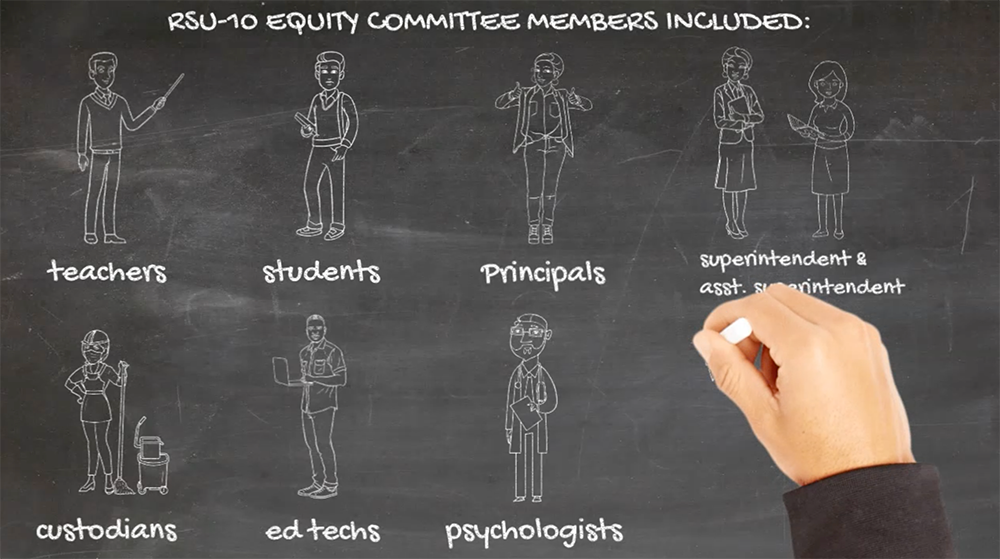Educational Equity:
Taking an Inclusive Approach to Equity in RSU-10 Western Foothills
At the Great Schools Partnership, we define educational equity as ensuring just outcomes for each student, raising marginalized voices, and challenging the imbalance of power and privilege.
In pursuit of these goals, RSU-10 Western Foothills took an inclusive approach to their equity work, using district- and school-based strategies to engage a wide variety of stakeholders. These strategies included:
- The creation of a district-wide equity team that included: teachers from an array of grades, students, principals, the superintendent, members of the school board, custodians, and more.
- School-based civil rights teams
- A diversity, equity, and inclusion (DEI) summit for students

GSP supported the work in RSU-10 with thought partnership and by customizing and facilitating professional learning experiences designed to raise participant awareness and knowledge. GSP also provided training and support to build the internal capacity, skills, and confidence among members of the RSU-10 equity team to advance equity, diversity, and inclusion in the school district and the community.
In pursuit of educational equity in RSU-10, a diverse array of students and educators undertook a variety of strategies intended to increase:
The capacity of members of the school community to talk about topics of equity and racial justice, and establish shared vocabulary across the district.
Awareness about persistent inequities and commitment to understanding and resolving inequities.
Outreach to and intentional engagement of diverse stakeholders, including community members.
The capacity of the district equity committee to design, plan, and lead initiatives in their district that address equity challenges and build a more inclusive school climate.
The capacity of the district equity committee to review and get meaning from data.

One of the primary strategies undertaken by educators in RSU-10 was the implementation of a district-wide equity committee. To learn more about the membership of this committee, please see the video below; then read on to discover more about what this committee intended to accomplish.

What Are the Goals of the Equity Committee?
As the district-wide equity committee in RSU-10 undertook its work, it helped conceive of and facilitate professional development opportunities in which staff from all schools worked toward the following goals:
Identify and share parts of our social identities; also, reflect on the perceived values of our identities, and interrogate their relative importance.
Develop a shared understanding of important concepts and terminology, such as social identity, marginalized group, privileged group, and more.
Engage in whole group discussions to challenge each other's assumptions, biases, and privileges.
Develop our facilitation and leadership skills to create self-sustaining practices
Identify specific goals and action steps that educators can use in their classrooms, schools, districts, or communities.
Increase awareness of how individual experiences, perspectives, and identities impact how people engage with those from other racial backgrounds.
Increase ability to identify specific actions and activities that have normalized racism in our schools and communities.
In addition to role students played on the district-wide equity committee, students attending schools in RSU-10 also participated in school-based civil rights teams, whose work culminated in a Diversity, Equity, and Inclusion (DEI) summit. Students not only participated in the conception of sessions, but also co-facilitated. This helped foster leadership and facilitation skills, as well as critical thinking skills.
Community agreements included:
- Creating a brave space
- Communicating with empathy
- Speaking from your own perspective
- Respecting confidentiality
- Seeking to understand
- Accepting non-closure
Logo for DEI Summit
Designed by Leila Croy, MVHS StudentDEI Summit Sessions
The below list of sessions from the 2021 DEI Summit at RSU-10 is not comprehensive, but is intended to illustrate the breadth of topics and depth of thinking.
Using your mouse or touchpad, roll over a session title to see a brief description.
Beyond the Hashtag: Seeing and Understanding the Black Lives Matter Movement
A presentation and discussion by a photographer who documented the #BLM movement for years.
Protesting, Partnerships, and Policing: How to Protest Effectively
A discussion-based examination of peaceful and effective protesting.
Why Pronouns Matter
An exploration of gender pronouns designed to advance all participants' understanding of what they mean and why it's so important to use them correctly.
Understanding Racism: A Guide for Students
Participants explored the four levels of racism and discovered how each level connects to each other.
Safe Spaces
Participants learned basic strategies on how to create a safe and inclusive space for LGBTQ+ students.
The Gender Unicorn
Participants identified and discussed the social constructions of gender.
DEI Summit Outcomes
The Student Equity Summit resulted in foundational learning among participants and concluded with group and self reflection on the following questions:
- What did you learn?
- Why does it matter?
- Now, what will you do with what you learned?
The goal of this reflection was to encourage students to think far beyond the summit. What happens next? What needs to change? How will that change be achieved? Such questions act as catalysts. Participants of the Student Equity Summit indicated in their feedback that they wanted to continue the work with renewed commitments to their school-based civil rights teams, as well as interest in creating equity teams at the school level.
Interested in learning more? Let's talk.
Personalized, equitable, and student-centered education is too important to put aside; together, we can improve learning for all your students.
Contact Us